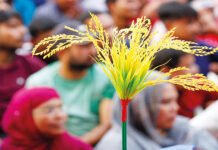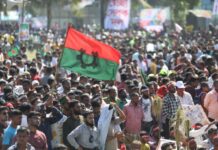Witnesses say the sons of three former politicians, including a deceased Jamaat head, are in state detention.
Police denial
In all three cases, the police deny any involvement in the detention. Masudur Rahman, spokesman for the Dhaka Metropolitan police, said: “We did not pick [Azmi] up, okay?” When asked whether any other law-enforcement agency had done so, he said: “I don’t know, I am only responsible for the Dhaka Metropolitan police.”
 |
None of the men has been brought to court within 24 hours of their alleged detention, as the law requires. Abul Kalam Azad, one of six people employed at Azmi’s house in Mogh Bazaar, said that more than 30 plain-clothed men cordoned off the house on Monday evening and proceeded to search “every single flat of the building”. He said that the men initially introduced themselves as “people from the administration”, but later asserted they were “DB”, which stands for Detective Branch of the police. “I was downstairs and some of the men started asking me about where was Azmi sir. I told them I was not sure,” Azad recalled. “Since they were not getting Azmi sir, they blindfolded my eyes and started beating me. I repeatedly said I do not know his whereabouts.” The men broke down the door of a locked, empty flat on the fifth floor and found Azmi. Azad claims that he heard Azmi say to the men, “Since you are going to take me, let me take some clothes”, but his plea was rejected.
Government’s concern
Azmi was then escorted to one of the vehicles at which point, according to Azad, he was blindfolded. The men took mobile phones from the house and the discs linked to local CCTV cameras. The three detentions follow the Bangladesh government’s concern about a decision given at the end of July by the county’s highest appeal court to adjourn a hearing involving the final appeal by Mir Quasem Ali against his execution. Later that day, newspapers reported that ministers had “expressed fears” that the convicted Jamaat leader, a businessman, would use the adjournment time to “plan extremist attacks … to disturb the country’s stability”. Sheikh Hasina, Bangladesh’s prime minister, was also quoted as saying that new “terror attacks” were being planned and that “their goal” was “to free Mir Quasem [Ali]”. The families of all three men deny any involvement in the ongoing activist attacks, which in early July resulted in the murder of 20 people, mostly foreigners, at an upmarket restaurant in the country’s capital. This attack was claimed by the Islamic State of Iraq and the Levant (ISIL) group.
‘Deeply worried’
Ever since ISIL, also known as ISIS, first claimed responsibility for a murder in Bangladesh of Italian citizen Cesare Tavella in Dhaka in September 2015, the government has pointed an accusing finger at opposition parties. The Appellate Court is due on Tuesday to pass its order on whether Mir Quasem Ali should be executed, and following the verdict, the death penalty could be carried out within days. Salman al-Azmi, Azmi’s UK-based brother, told Al Jazeera that the police were refusing to receive a complaint – known as a general diary or GD – about the detention of his brother. “The manner in which the series of abductions have taken place and no one has been accounted for so far, we fear the worst and are deeply worried about his safety,” Salman al-Azmi said. “We are not able to guess what the government wants to achieve through this illegal abduction and what they intend to do with my innocent brother.” Mashiur Rahman, the officer in charge of the local Ramna police station, acknowledged that the family had come to make a complaint. “The matter was so sensitive, so I told them that they should let us investigate the matter first before filing a GD,” he told Al Jazeera. With reporting by Muktadir Rashid in Dhaka Source: Al Jazeera News









